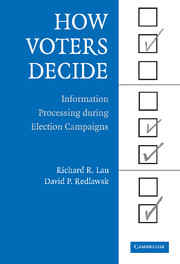Book contents
- Frontmatter
- Contents
- List of Tables and Figures
- Acknowledgments
- HOW VOTERS DECIDE
- I Theory and Methods
- 1 Introduction
- 2 A New Theory of Voter Decision Making
- 3 Studying Voting as a Process
- 4 What Is Correct Voting?
- II Information Processing
- III Politics
- IV Conclusion
- Appendix A Detailed Examples of Decision Strategies in Action
- Appendix B How the Dynamic Information Board Works
- Appendix C Overview of Experimental Procedures
- Appendix D Detailed Decision Scripts
- Appendix E Calculating the On-line Evaluation Counter
- References
- Index
- Titles in the series
2 - A New Theory of Voter Decision Making
Published online by Cambridge University Press: 05 September 2012
- Frontmatter
- Contents
- List of Tables and Figures
- Acknowledgments
- HOW VOTERS DECIDE
- I Theory and Methods
- 1 Introduction
- 2 A New Theory of Voter Decision Making
- 3 Studying Voting as a Process
- 4 What Is Correct Voting?
- II Information Processing
- III Politics
- IV Conclusion
- Appendix A Detailed Examples of Decision Strategies in Action
- Appendix B How the Dynamic Information Board Works
- Appendix C Overview of Experimental Procedures
- Appendix D Detailed Decision Scripts
- Appendix E Calculating the On-line Evaluation Counter
- References
- Index
- Titles in the series
Summary
One of the expressed goals of this work is the development of a new process-oriented approach to voter decision making and the elaboration of a new set of measures for studying it. That is the task of this chapter. We begin with a very basic idea. Voter decision making cannot be much different from most other decisions people make in their daily lives. There is nothing special about the political environment that should cause people to overcome magically the limitations of human cognition. Indeed, everything we know about how citizens view politics suggests that for most people, most of the time, politics is usually a minor concern. Yet in certain high-profile situations such as presidential elections, citizens can hardly avoid exposure to politics and to the steady stream of political information that is made available. How can people cope with a potentially confusing and easily overwhelming information environment when they are motivated to pay at least some attention, but unable to devote superhuman cognitive resources to the task? Assuming one is going to make a choice, some process for acquiring information and evaluating it is necessary.
As we argued in Chapter 1, however, most prior models of the vote choice tend to ignore the role of information acquisition and focus entirely on the end result. Virtually all political science models of the vote decision have adopted a Model 1 or a Model 2 view of decision making.
- Type
- Chapter
- Information
- How Voters DecideInformation Processing in Election Campaigns, pp. 21 - 46Publisher: Cambridge University PressPrint publication year: 2006

